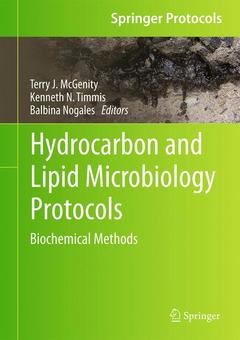Hydrocarbon and Lipid Microbiology Protocols, 1st ed. 2016 Biochemical Methods Springer Protocols Handbooks Series
Langue : Anglais

This Volume provides protocols for the biochemical analysis of hydrocarbon- and lipid-relevant products, cell components and activities of microbes that interact with hydrophobic compounds. They include methods for the extraction, purification and characterisation of surface tension-reducing bioemulsifiers and biosurfactants that increase the surface area and hence bioavailability of hydrophobic substrates. Protocols for the isolation and biochemical analysis of lipids and polyhydroxyalkanoates, food storage products made during nutrient abundance that represent important biotechnological products, are presented. The extraction of membrane lipid rafts, sub-organelles that fulfil important functional roles for the cell membrane, and the isolation and characterisation of membrane phospholipid biomarkers, are also described. The purification and characterisation of integral membrane hydrocarbon-oxidising enzymes are addressed. Lastly, two generic methods for the genetic analysis of catabolic pathways and analysis of ligand binding are presented.
Hydrocarbon and Lipid Microbiology Protocols
There are tens of thousands of structurally different hydrocarbons, hydrocarbon derivatives and lipids, and a wide array of these molecules are required for cells to function. The global hydrocarbon cycle, which is largely driven by microorganisms, has a major impact on our environment and climate. Microbes are responsible for cleaning up the environmental pollution caused by the exploitation of hydrocarbon reservoirs and will also be pivotal in reducing our reliance on fossil fuels by providing biofuels, plastics and industrial chemicals. Gaining an understanding of the relevant functions of the wide range of microbes that produce, consume and modify hydrocarbons and related compounds will be key to responding to these challenges. This comprehensive collection of current and emerging protocols will facilitate acquisition of this understanding and exploitation of useful activities of such microbes.
Introduction.- Protocols for the isolation and analysis of lipopeptides and bioemulsifiers.- Protocols for the detection and chemical characterisation of microbial glycolipids.- Isolation of glycoprotein bioemulsifiers produced by marine bacteria.- Protocols for lipid extraction from wet algal biomass.- Isolation and characterization of lipid droplets from yeast.- Protocols for Isolation and Analysis of Polyhydroxyalkanoates.- Purification of lipid rafts from bacterial membranes.- Isolation and analysis of membrane phospholipids as biomarkers.- Protocols for purifying and characterizing integral membrane AlkB enzymes.- Protocols for structural and functional analysis of particulate methane monooxygenase from Methylocystis species strain Rockwell (ATCC 49242).- Phenotype-based Identification of key enzymes for polycyclic aromatic hydrocarbon (PAH) metabolism from Mycobacteria using transposon mutagenesis and a PAH spray plate.- Microcalorimetry as a general technique to characterize ligand binding.
Offers readily-reproducible step-by-step laboratory methods Provides helpful tips and tricks supporting the protocols Includes troubleshooting advice Contains practical laboratory guidance to promote successful results
Date de parution : 09-2016
Ouvrage de 188 p.
17.8x25.4 cm
Date de parution : 06-2018
Ouvrage de 188 p.
17.8x25.4 cm
Thèmes de Hydrocarbon and Lipid Microbiology Protocols :
© 2024 LAVOISIER S.A.S.



